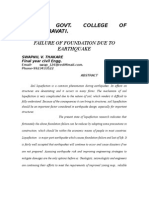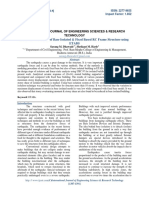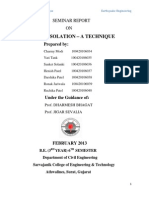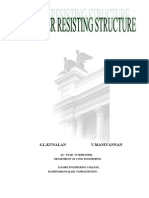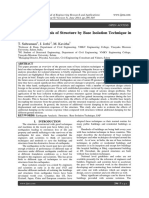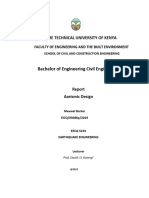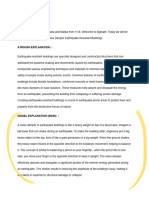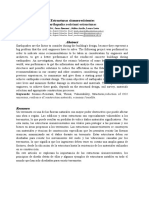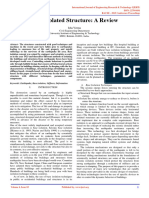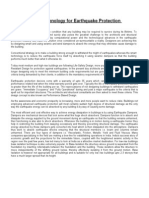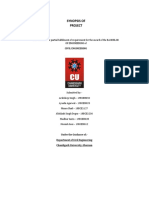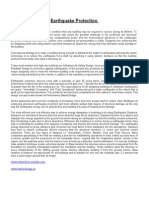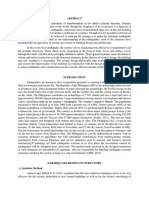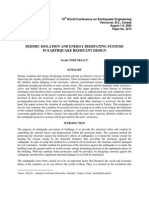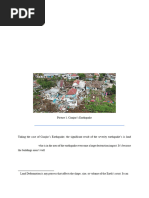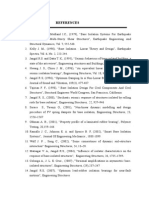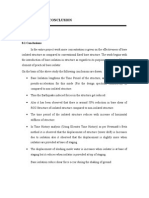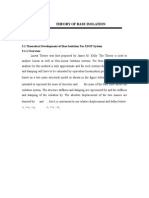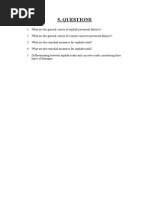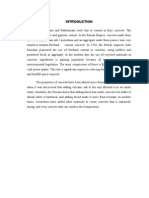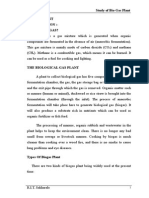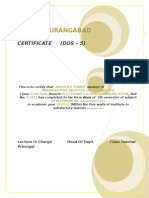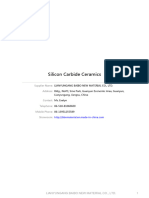0 ratings0% found this document useful (0 votes)
36 viewsKey Words-Base Isolation, Base Isolated Structure Design, Earthquake Design
Key Words-Base Isolation, Base Isolated Structure Design, Earthquake Design
Uploaded by
PradeepLokhande1) Seismologists and engineers have sought to understand earthquakes and develop earthquake-resistant building designs for over a century.
2) While earthquakes cannot be prevented, their effects can be minimized through engineering techniques. Engineers have developed various methods for building structures that are resistant to earthquakes.
3) Two key approaches to developing earthquake-resistant structures are base isolation, which isolates the structure from ground movement using low-stiffness supports, and increasing damping, which reduces earthquake-generated forces on the structure.
Copyright:
© All Rights Reserved
Available Formats
Download as DOC, PDF, TXT or read online from Scribd
Key Words-Base Isolation, Base Isolated Structure Design, Earthquake Design
Key Words-Base Isolation, Base Isolated Structure Design, Earthquake Design
Uploaded by
PradeepLokhande0 ratings0% found this document useful (0 votes)
36 views2 pages1) Seismologists and engineers have sought to understand earthquakes and develop earthquake-resistant building designs for over a century.
2) While earthquakes cannot be prevented, their effects can be minimized through engineering techniques. Engineers have developed various methods for building structures that are resistant to earthquakes.
3) Two key approaches to developing earthquake-resistant structures are base isolation, which isolates the structure from ground movement using low-stiffness supports, and increasing damping, which reduces earthquake-generated forces on the structure.
Original Description:
civil
Original Title
Abstract
Copyright
© © All Rights Reserved
Available Formats
DOC, PDF, TXT or read online from Scribd
Share this document
Did you find this document useful?
Is this content inappropriate?
1) Seismologists and engineers have sought to understand earthquakes and develop earthquake-resistant building designs for over a century.
2) While earthquakes cannot be prevented, their effects can be minimized through engineering techniques. Engineers have developed various methods for building structures that are resistant to earthquakes.
3) Two key approaches to developing earthquake-resistant structures are base isolation, which isolates the structure from ground movement using low-stiffness supports, and increasing damping, which reduces earthquake-generated forces on the structure.
Copyright:
© All Rights Reserved
Available Formats
Download as DOC, PDF, TXT or read online from Scribd
Download as doc, pdf, or txt
0 ratings0% found this document useful (0 votes)
36 views2 pagesKey Words-Base Isolation, Base Isolated Structure Design, Earthquake Design
Key Words-Base Isolation, Base Isolated Structure Design, Earthquake Design
Uploaded by
PradeepLokhande1) Seismologists and engineers have sought to understand earthquakes and develop earthquake-resistant building designs for over a century.
2) While earthquakes cannot be prevented, their effects can be minimized through engineering techniques. Engineers have developed various methods for building structures that are resistant to earthquakes.
3) Two key approaches to developing earthquake-resistant structures are base isolation, which isolates the structure from ground movement using low-stiffness supports, and increasing damping, which reduces earthquake-generated forces on the structure.
Copyright:
© All Rights Reserved
Available Formats
Download as DOC, PDF, TXT or read online from Scribd
Download as doc, pdf, or txt
You are on page 1of 2
ABSTRACT
Seismologists and earthquake engineers have sought to understand and predict
earthquakes and to develop better building designs to withstand hem for well over a
century.
The last decade of 20
th
century has seen much progress in comprehending the
source processes of Indian earthquakes. As earthquake causes much destruction we
cannot prevent it from striking but its effect can be minimi!ed. "ngineers have developed
a number of ways to build earthquake resistant structure. In the areas where earthquake
are likely knowing where to build and how to build can help reduce in#ury loss of life
and property damage during a earthquake. $nowing what to do when a quake strikes can
also help prevent in#uries and deaths.
There are various methods and technologies are developed to resist the effect of
earthquake. These technologies are used during the construction. The techniques range
from e%tremely simple to fairly comple%. Also after the destruction caused due to natural
disaster such as earthquake there are various technologies available which helps to
reconstruct the new structure which is safe from the effect of earthquake.
In contrast we can say that the basic approach underlying more advanced
techniques for earthquake resistant is not to strength the building but to reduce the
earthquake&generated forces acting upon it. 'y de&coupling the structure from seismic
ground motion it is possible to reduce the earthquake induced forces in it. This can be
done in two ways(&
). Increase natural period of structure by *'AS" IS+,ATI+-..
2. Increased damping of the system by *"-"/01 2SSI3ATI-0 2"4I5"S..
The traditional engineering design strategy based on increasing design capacity
and stiffness to accommodate foreseeable lateral forces may not be the efficient solution.
The problem with the later all seismic forces from the ground will be absorbed by the
superstructure. The base isolation strategy is opposite of traditional engineering design
strategy. 'ase isolation is a system that protects the building from damaging effect of
seismic movement. If the structure separates from the ground during an earthquake the
ground is moving but structure is still dormant. The current technology that is active and
e%panding is the introduction of low lateral stiffness support that isolates the structure
from the ground movement.
6ith this work comparison the behavior of conventional and base isolated
structure
6e concluded that base isolated structure less destructive against lateral displacement.
Key words- base isolation base isolated structure design earthquake design.
You might also like
- 01 Moalboal BABOYAN-approved-budgetDocument11 pages01 Moalboal BABOYAN-approved-budgetMyron TimtimNo ratings yet
- Earthquake Resistant Building Design ReportDocument38 pagesEarthquake Resistant Building Design ReportPalash Mehta50% (2)
- Failure of Foundation Due To EarthquakeDocument10 pagesFailure of Foundation Due To EarthquakePradeepLokhande100% (3)
- Seismic Performance of Base Isolated andDocument5 pagesSeismic Performance of Base Isolated andDina SalloumNo ratings yet
- Local Media7289550271401840107Document3 pagesLocal Media7289550271401840107Crispin NasamNo ratings yet
- Seismic Protection With Base Isolation Method Using EtabsDocument6 pagesSeismic Protection With Base Isolation Method Using EtabsPrashant TiwariNo ratings yet
- MajidDocument5 pagesMajidmajidalkahramanNo ratings yet
- Project BokDocument44 pagesProject BokPraveenNo ratings yet
- Base Isolation - Final ReportDocument23 pagesBase Isolation - Final ReportYati Tank76% (25)
- Earthquake Resistant Building DesignDocument22 pagesEarthquake Resistant Building DesignAnu Alreja100% (1)
- Natural Disaster Management and Earthquake ResistantdesignDocument9 pagesNatural Disaster Management and Earthquake ResistantdesignRavikiranSharmaSrkNo ratings yet
- (Paper) Base Isolation For Earthquake-Resistant Design PDFDocument41 pages(Paper) Base Isolation For Earthquake-Resistant Design PDFRAJENDRA PRASADNo ratings yet
- Base Isolation and Seismic Consideration in Earthquake Resistant StructuresDocument15 pagesBase Isolation and Seismic Consideration in Earthquake Resistant StructuresAuqib BhattNo ratings yet
- Earthquake Resistant Design of StructuresDocument13 pagesEarthquake Resistant Design of StructuresMilan LamsalNo ratings yet
- Air LevitationDocument4 pagesAir LevitationIndraneel TilveNo ratings yet
- EqrsDocument7 pagesEqrstwinkle4545No ratings yet
- Earthquake Resistant Buildings ThesisDocument7 pagesEarthquake Resistant Buildings Thesismkdswzgig100% (2)
- S.L.Kunalan V.Manivannan: (Ii - Year / Iv Semester) Department of Civil EngineeringDocument11 pagesS.L.Kunalan V.Manivannan: (Ii - Year / Iv Semester) Department of Civil Engineeringgsudhanta1604No ratings yet
- JOU - EQ Analysis of Structure by Base Isolation Technique in SAP PDFDocument10 pagesJOU - EQ Analysis of Structure by Base Isolation Technique in SAP PDFIlham Hussein RasyidNo ratings yet
- Seismic Design of StructuresDocument8 pagesSeismic Design of StructuresMuyiwa AyodejiNo ratings yet
- Seismic Study of Irregular Building Structures A Review 2Document7 pagesSeismic Study of Irregular Building Structures A Review 2Shahzad AnwarNo ratings yet
- Ici Iwc PaperDocument1 pageIci Iwc PaperDebasish BandyopadhyayNo ratings yet
- Base IsolationDocument12 pagesBase IsolationDharmesh DharmaNo ratings yet
- Analysis and Seismic Response ReductionDocument6 pagesAnalysis and Seismic Response ReductionSabi HaNo ratings yet
- Al Je Roe ResearchDocument4 pagesAl Je Roe ResearchLouis DeleonNo ratings yet
- EarthquakeDocument15 pagesEarthquakemax JosephNo ratings yet
- Earthquake Resistant BuildingDocument13 pagesEarthquake Resistant BuildingChandan SrivastavaNo ratings yet
- An Introduction To Earthquake EngineeringDocument4 pagesAn Introduction To Earthquake EngineeringJomar D. MarquezNo ratings yet
- Models ExplainationDocument2 pagesModels ExplainationMalika SrivastavaNo ratings yet
- Component Longevity in Terms of Operation Performance and Resistance To Deleterious ForcesDocument8 pagesComponent Longevity in Terms of Operation Performance and Resistance To Deleterious ForcesPalanisamy RajaNo ratings yet
- Estructuras Sismo Resistentes, CorregidoDocument10 pagesEstructuras Sismo Resistentes, CorregidoLaura Sofia Le�N �LvarezNo ratings yet
- Bhanu Parshad Kandel ReportDocument32 pagesBhanu Parshad Kandel ReportSaugat ThapaNo ratings yet
- Comparative Analysis of Structure For Calamity by Using Midas Gen, ETABS and STAAD ProDocument11 pagesComparative Analysis of Structure For Calamity by Using Midas Gen, ETABS and STAAD ProIJRASETPublicationsNo ratings yet
- Base Isolated Structure A Review IJERTCONV4IS03036Document5 pagesBase Isolated Structure A Review IJERTCONV4IS03036Shivam SrivastavaNo ratings yet
- PBL FINAL PROJECT REPORT-1Document32 pagesPBL FINAL PROJECT REPORT-1Sarthak SuranaNo ratings yet
- Use of Lead Rubber Bearing For Base Isolation TechDocument15 pagesUse of Lead Rubber Bearing For Base Isolation TechSandipan DharNo ratings yet
- 0000 Best Earthquake ProtectionDocument1 page0000 Best Earthquake ProtectiondonaldshahNo ratings yet
- 1 Performance Limits of Seismically Isolated Buildings Under Near-FieldDocument12 pages1 Performance Limits of Seismically Isolated Buildings Under Near-Fieldcivilabsences54No ratings yet
- LatestDocument6 pagesLatestMadhur SarinNo ratings yet
- 0000 Earthquake ProtectionDocument1 page0000 Earthquake ProtectiondonaldshahNo ratings yet
- Seismic Performance of Structure With Fixed BaseDocument9 pagesSeismic Performance of Structure With Fixed Basecivilabsences54No ratings yet
- Comparison of Seismic Behavior of Building With Fixed Base, Base Isolator and Shear WallDocument5 pagesComparison of Seismic Behavior of Building With Fixed Base, Base Isolator and Shear WallPremalatha JeyaramNo ratings yet
- E11275 e TarjomeDocument25 pagesE11275 e Tarjomefausto giovannardiNo ratings yet
- 6 III March 2018Document7 pages6 III March 2018KASHIFNo ratings yet
- Base IsolationDocument11 pagesBase IsolationShubham sugriv nagargojeNo ratings yet
- AdityaDocument144 pagesAdityaK RaghuNo ratings yet
- Earthquake Resistant ConstructionDocument3 pagesEarthquake Resistant ConstructionSanjanSanjuNo ratings yet
- Base IsolationDocument31 pagesBase IsolationMalikSayim100% (3)
- OtaniDocument19 pagesOtanialexanderhcNo ratings yet
- Recent Advances in Earthquake Resistant Construction PracticesDocument7 pagesRecent Advances in Earthquake Resistant Construction PracticesCynth BalmesNo ratings yet
- Seismic Isolation and Energy Dissipating Systems in Earthquake Resistant DesignDocument12 pagesSeismic Isolation and Energy Dissipating Systems in Earthquake Resistant Designdjani_ipNo ratings yet
- Effects in Buildings Due To Seismic PoundingDocument27 pagesEffects in Buildings Due To Seismic PoundinginventionjournalsNo ratings yet
- Pushover Analysis of RCC Framed StructurDocument23 pagesPushover Analysis of RCC Framed StructurGleizel AutorNo ratings yet
- Literature Review of Base IsolationDocument17 pagesLiterature Review of Base IsolationSajol Sarker100% (1)
- 89 Case Study of Earthquake Resistant Structure and Its Recent Innovation in ConstructionDocument5 pages89 Case Study of Earthquake Resistant Structure and Its Recent Innovation in ConstructionShila KambleNo ratings yet
- Javier Ezra Masangin - Resilience Infrastructure - Preventing Threats by Real Case-1Document3 pagesJavier Ezra Masangin - Resilience Infrastructure - Preventing Threats by Real Case-1javierezram1No ratings yet
- My Real Project YANDocument38 pagesMy Real Project YANIntresting Tube0% (1)
- Drift Control and Damage in Tall BuildingsDocument10 pagesDrift Control and Damage in Tall BuildingsL YO PinNo ratings yet
- Making Hospitals Safe From EarthquakesDocument86 pagesMaking Hospitals Safe From EarthquakesReigna SantillanaNo ratings yet
- Assessing Seismic Resilience in Suspension Bridges: Nonlinear Modeling and Strategies for Mitigating FailuresFrom EverandAssessing Seismic Resilience in Suspension Bridges: Nonlinear Modeling and Strategies for Mitigating FailuresNo ratings yet
- Unshakeable: Engineering Buildings to Withstand Mother NatureFrom EverandUnshakeable: Engineering Buildings to Withstand Mother NatureNo ratings yet
- Literature Review: 2.1 OverviewDocument6 pagesLiterature Review: 2.1 OverviewPradeepLokhandeNo ratings yet
- Ground Improvement Technique-1Document13 pagesGround Improvement Technique-1PradeepLokhandeNo ratings yet
- CHAP10Document2 pagesCHAP10PradeepLokhandeNo ratings yet
- Faculty Profile Format AICTEDocument1 pageFaculty Profile Format AICTEPradeepLokhandeNo ratings yet
- Performance of Simple StructureDocument6 pagesPerformance of Simple StructurePradeepLokhandeNo ratings yet
- Fibre Reinforced ConcreteDocument12 pagesFibre Reinforced ConcretePradeepLokhande100% (2)
- Chapter 4 Performance of Base Isolated Structure: Why Base Isolation Is Effective?Document8 pagesChapter 4 Performance of Base Isolated Structure: Why Base Isolation Is Effective?PradeepLokhandeNo ratings yet
- Chapter 4 Conclusion: 8.1 ConclusionsDocument2 pagesChapter 4 Conclusion: 8.1 ConclusionsPradeepLokhandeNo ratings yet
- Chap 9Document1 pageChap 9PradeepLokhandeNo ratings yet
- 3 Theory of Base IsolationDocument10 pages3 Theory of Base IsolationPradeepLokhandeNo ratings yet
- Chapter 4 Comparision of Simple and Base Isolated StructureDocument1 pageChapter 4 Comparision of Simple and Base Isolated StructurePradeepLokhandeNo ratings yet
- Geopolymer ConcreteDocument43 pagesGeopolymer ConcretePradeepLokhandeNo ratings yet
- QuestionsDocument1 pageQuestionsPradeepLokhandeNo ratings yet
- Repairs of Asphalt RoadsDocument16 pagesRepairs of Asphalt RoadsPradeepLokhandeNo ratings yet
- Repairs of Concrete Roads: 1. Failure in Cement Concrete PavementsDocument10 pagesRepairs of Concrete Roads: 1. Failure in Cement Concrete PavementsPradeepLokhande100% (1)
- Concrete BasicsDocument27 pagesConcrete BasicsPradeepLokhandeNo ratings yet
- Implosion of StructureDocument9 pagesImplosion of StructurePradeepLokhandeNo ratings yet
- Cracks in ConcereteDocument37 pagesCracks in ConceretePradeepLokhandeNo ratings yet
- A Project Report ON: Mr. Pravin Patil Mr. Amol Chavan Mr. Shrikant UbareDocument84 pagesA Project Report ON: Mr. Pravin Patil Mr. Amol Chavan Mr. Shrikant UbarePradeepLokhandeNo ratings yet
- Assignment No. 15.: Matrix DiagramDocument14 pagesAssignment No. 15.: Matrix DiagramPradeepLokhandeNo ratings yet
- Biogas PlantDocument42 pagesBiogas PlantPradeepLokhande100% (1)
- Mit (T) Aurangabad: Certificate (Dos - 5)Document1 pageMit (T) Aurangabad: Certificate (Dos - 5)PradeepLokhandeNo ratings yet
- Assignment No. 8.: BrainstormingDocument7 pagesAssignment No. 8.: BrainstormingPradeepLokhandeNo ratings yet
- Assignment No - 7.: Control ChartDocument7 pagesAssignment No - 7.: Control ChartPradeepLokhandeNo ratings yet
- Kiln DriveDocument83 pagesKiln DriveMohammed B100% (1)
- The Waterfall Model in Large-Scale Development: Abstract. Waterfall Development Is Still A Widely Used Way of WorkingDocument2 pagesThe Waterfall Model in Large-Scale Development: Abstract. Waterfall Development Is Still A Widely Used Way of WorkingSaadi SiddiquiNo ratings yet
- Case Study 1Document8 pagesCase Study 1Agnes AmpoNo ratings yet
- 11 IPv6 Basics - 1609740899328Document38 pages11 IPv6 Basics - 1609740899328hernantroyathiagoNo ratings yet
- Robotraffic - Hardware DevicesDocument50 pagesRobotraffic - Hardware DevicesAnita AlmeidaNo ratings yet
- KOMEXS Manual enDocument53 pagesKOMEXS Manual enpebi liveNo ratings yet
- MuniKrishna 2007Document334 pagesMuniKrishna 2007Hariharan RamanathanNo ratings yet
- PARA SeminarDocument2 pagesPARA SeminarShielaMarie MalanoNo ratings yet
- Blaupunkt Trd41 RotterdamDocument36 pagesBlaupunkt Trd41 RotterdamLuk KaluznyNo ratings yet
- Litq Ar ReportDocument7 pagesLitq Ar Reportdharshanbv4dgmNo ratings yet
- Noel Hutchinson v. United States Department of Justice Drug Enforcement Administration, 108 F.3d 1369, 2d Cir. (1997)Document3 pagesNoel Hutchinson v. United States Department of Justice Drug Enforcement Administration, 108 F.3d 1369, 2d Cir. (1997)Scribd Government DocsNo ratings yet
- Parts List For Electrostatic Precipitator HV Unit On Roof Branch BoxDocument8 pagesParts List For Electrostatic Precipitator HV Unit On Roof Branch Boxgreensupply.salesNo ratings yet
- Jharkhand: Economic SnapshotDocument1 pageJharkhand: Economic SnapshotVinit KumarNo ratings yet
- Release InformationDocument16 pagesRelease InformationtvcorreaNo ratings yet
- English 10 Quarter 4 Module 7Document16 pagesEnglish 10 Quarter 4 Module 7Marife Magsino100% (4)
- T 69 B 1Document3 pagesT 69 B 1seiscincocerodosNo ratings yet
- Centrifuge Modeling of Laterally Loaded Pile Groups in Improved Soft ClayDocument13 pagesCentrifuge Modeling of Laterally Loaded Pile Groups in Improved Soft ClayRizky SanadiNo ratings yet
- Brennan, Niamh (2005) Accounting Expertise in Litigation and Dispute Resolution, Journal of Forensic Accounting, VI (2) : 13-35.Document20 pagesBrennan, Niamh (2005) Accounting Expertise in Litigation and Dispute Resolution, Journal of Forensic Accounting, VI (2) : 13-35.Prof Niamh M. BrennanNo ratings yet
- Money and Banking MCQ CUET QuestionsDocument6 pagesMoney and Banking MCQ CUET Questionskishanpathak247No ratings yet
- Kärcher K5.700 PDFDocument7 pagesKärcher K5.700 PDFAGNo ratings yet
- Sweat Equity FlyerDocument2 pagesSweat Equity Flyerkhuang.emeNo ratings yet
- FXOL KID v1.2Document5 pagesFXOL KID v1.2israeltampwo2No ratings yet
- Ijavs TemplateDocument3 pagesIjavs Templateferen putriNo ratings yet
- SF s4 Ec Ee Data Hci En-UsDocument254 pagesSF s4 Ec Ee Data Hci En-UsronakjhuthawatNo ratings yet
- Consolidation Sample ProblemDocument3 pagesConsolidation Sample ProblemLeila Nicole FulgencioNo ratings yet
- WORK INSTRUCTION For TrimosDocument10 pagesWORK INSTRUCTION For TrimosPartth VachhaniNo ratings yet
- Publications by Tim Sandle (3rd Revision)Document42 pagesPublications by Tim Sandle (3rd Revision)Tim SandleNo ratings yet
- Silicon Carbide CeramicsDocument16 pagesSilicon Carbide Ceramicspushkar rawaleNo ratings yet
- Empanelment of Pipes SpecialsDocument17 pagesEmpanelment of Pipes Specialsmanrals.ramNo ratings yet


